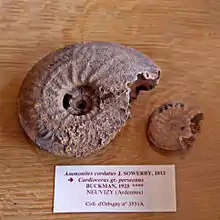Cardioceras
Cardioceras is an extinct ammonite genus belonging to the family Cardioceratidae. These fast-moving nektonic carnivores lived during the Jurassic period, Oxfordian age.[2][3]
| Cardioceras | |
|---|---|
 | |
| Fossil of Cardioceras persecans from France, on display at Galerie de paléontologie et d'anatomie comparée in Paris | |
| Scientific classification | |
| Kingdom: | |
| Class: | |
| Subclass: | |
| Order: | |
| Superfamily: | |
| Family: | |
| Genus: | Cardioceras |
Description
Shells of Cardioceras species can reach a diameter of 20–25 millimetres (0.79–0.98 in).[4] The shape is circular, with ribs and a prominent ridge along the dorsal edge.[5]
Distribution
Fossils of species within this genus have been found in the Jurassic of France, Germany, Poland, Russia and United Kingdom.[1]
References
- "Paleobiology Database - Cardioceras". Retrieved 2017-10-19.
- Sepkoski, Jack (2002). "A compendium of fossil marine animal genera (Cephalopoda entry)". Bulletins of American Paleontology. 363: 1–560. Archived from the original on 2008-05-07. Retrieved 2017-10-18.
- Mikko's Phylogeny Archive
- Cardioceras.ru
- Encyclopædia Britannica
This article is issued from Wikipedia. The text is licensed under Creative Commons - Attribution - Sharealike. Additional terms may apply for the media files.